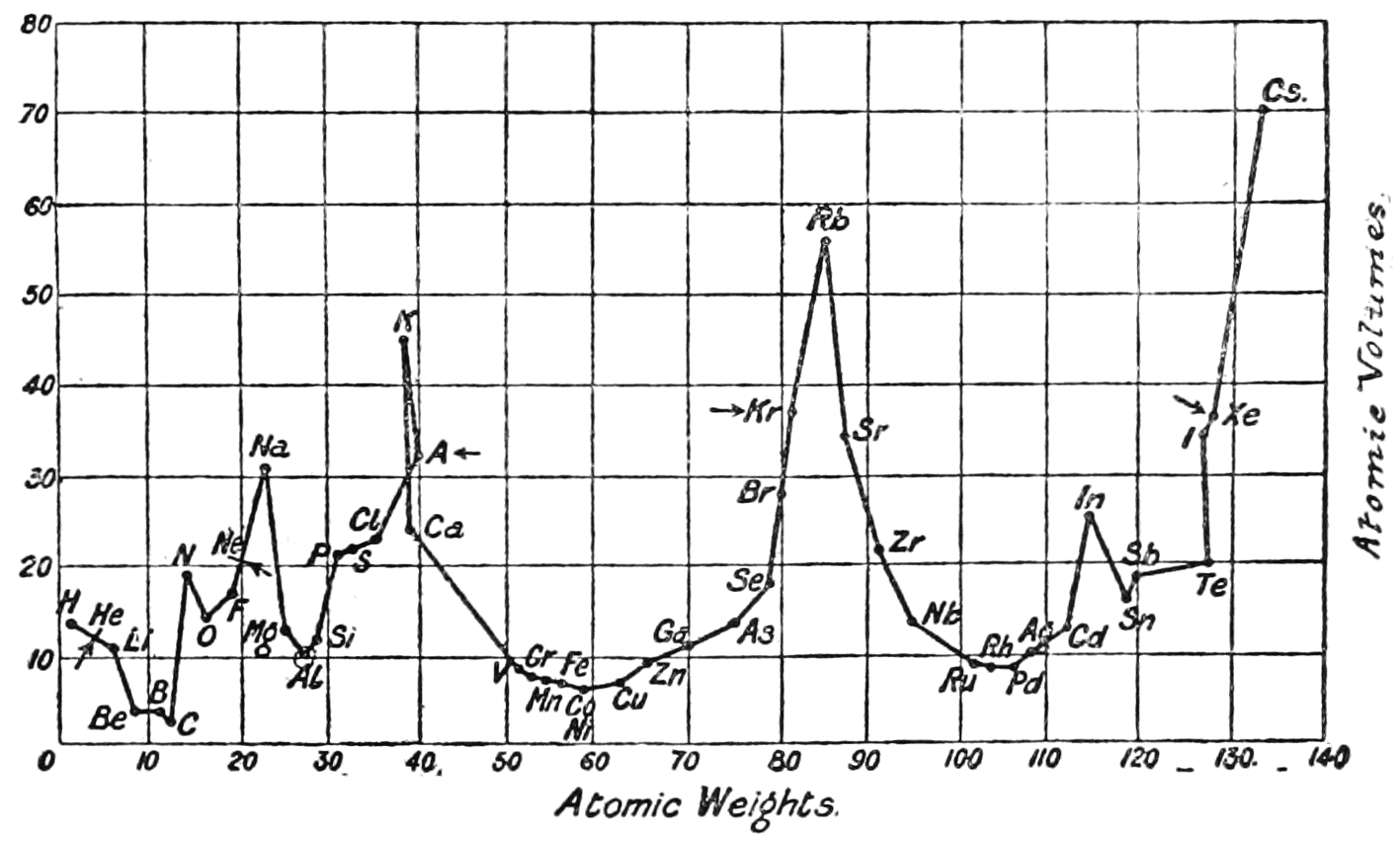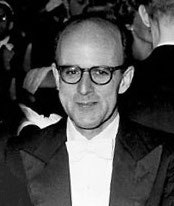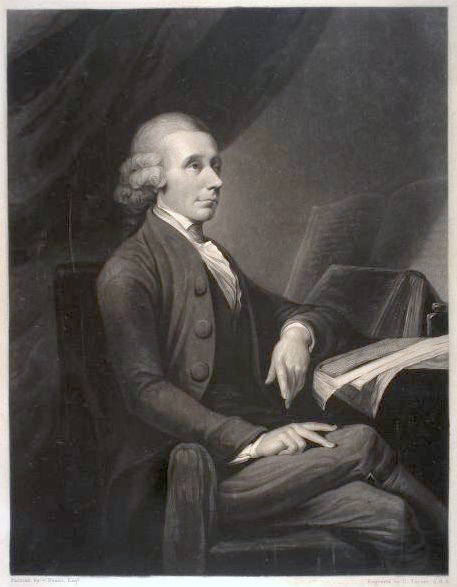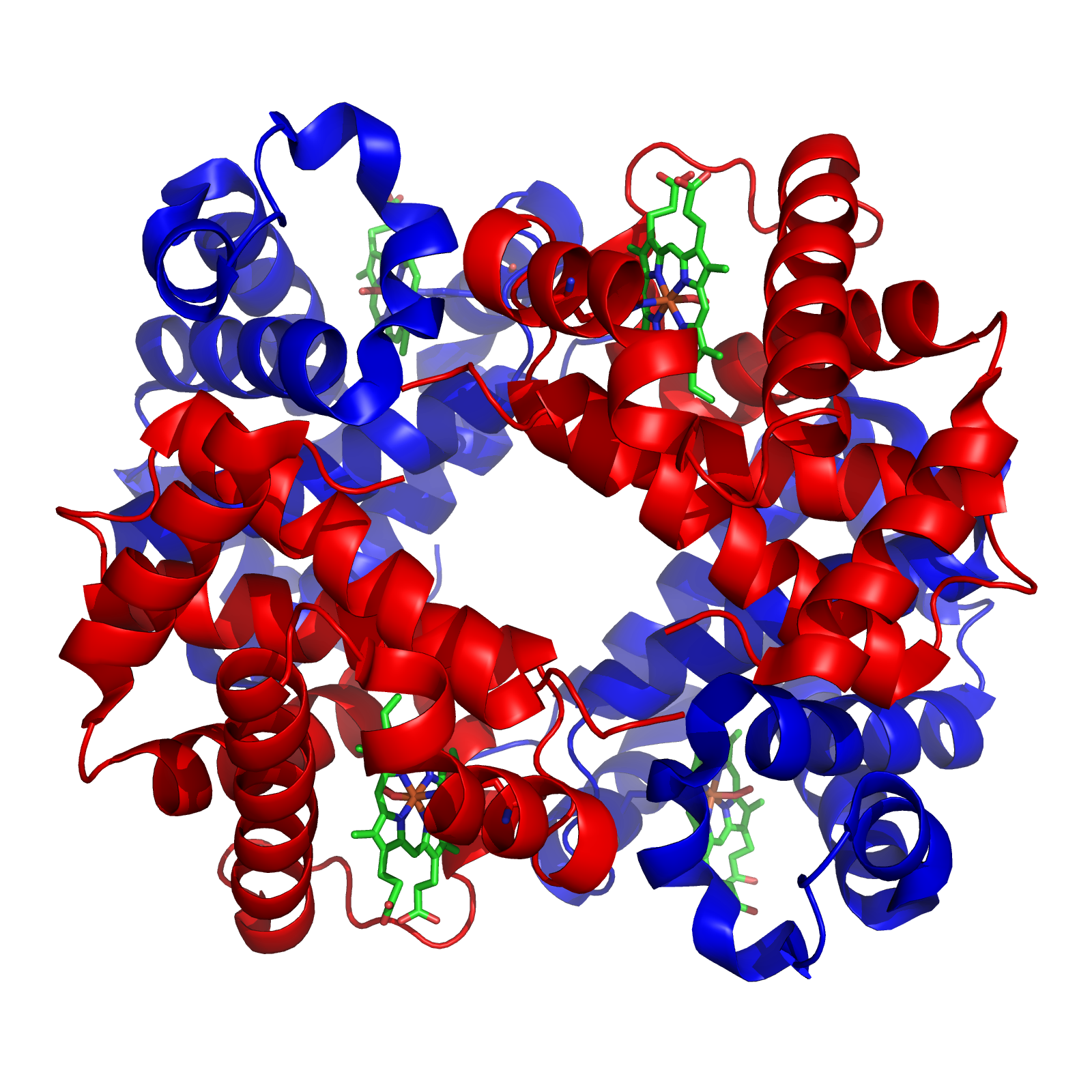|
Lothar Meyer
Julius Lothar Meyer (19 August 1830 – 11 April 1895) was a German chemist. He was one of the pioneers in developing the earliest versions of the periodic table of the chemical elements. Russian chemist Dmitri Mendeleev (his chief rival) and he had both worked with Robert Bunsen. Meyer never used his first given name, and was known throughout his life simply as Lothar Meyer. Career Lothar Meyer was born in Varel, Germany (then part of the Duchy of Oldenburg). He was the son of Friedrich August Meyer, a physician, and Anna Biermann. After attending the Altes Gymnasium in Oldenburg, he studied medicine at the University of Zurich in 1851. Two years later, he studied at the University of Würzburg, where he studied pathology, as a student of Rudolf Virchow. At Zurich, he had studied under Carl Ludwig, which had prompted him to devote his attention to physiological chemistry. After graduating as a Doctor of Medicine from Würzburg in 1854, he went to the University of Heidelberg, ... [...More Info...] [...Related Items...] OR: [Wikipedia] [Google] [Baidu] |
Varel
Varel () is a town in the district of Friesland, in Lower Saxony, Germany. It is situated near the Jade River and the Jade Bight, approximately south of Wilhelmshaven and north of Oldenburg. With a population of 23,984 (2020) it is the biggest town in the district of Friesland. Geography Varel is located south of the Jade Bight at the North Sea on the Geest. Over time, the city expanded into lower areas as the construction of dykes helped to secure these areas from floods. The environment of Varel is shaped by agriculture, forests and the sea. Neighbour municipalities Jade in the district of Wesermarsch is the Eastern neighbour municipality of Varel. In the South of Varel one will find the municipalities Rastede and Wiefelstede which are part of the district of Ammerland. The municipality of Bockhorn is located in the West of Varel. Bockhorn is also part of the district of Friesland. Segmentation of the city Varel is segmented into 21 localities. Besides the d ... [...More Info...] [...Related Items...] OR: [Wikipedia] [Google] [Baidu] |
Rudolf Virchow
Rudolf Ludwig Carl Virchow (; or ; 13 October 18215 September 1902) was a German physician, anthropologist, pathologist, prehistorian, biologist, writer, editor, and politician. He is known as "the father of modern pathology" and as the founder of social medicine, and to his colleagues, the "Pope of medicine". Virchow studied medicine at the Friedrich Wilhelm University under Johannes Peter Müller. While working at the Charité hospital, his investigation of the 1847–1848 typhus epidemic in Upper Silesia laid the foundation for public health in Germany, and paved his political and social careers. From it, he coined a well known aphorism: "Medicine is a social science, and politics is nothing else but medicine on a large scale". His participation in the Revolution of 1848 led to his expulsion from Charité the next year. He then published a newspaper ''Die Medizinische Reform'' (''The Medical Reform''). He took the first Chair of Pathological Anatomy at the University of ... [...More Info...] [...Related Items...] OR: [Wikipedia] [Google] [Baidu] |
Privatdozent
''Privatdozent'' (for men) or ''Privatdozentin'' (for women), abbreviated PD, P.D. or Priv.-Doz., is an academic title conferred at some European universities, especially in German-speaking countries, to someone who holds certain formal qualifications that denote an ability (''facultas docendi'') and permission to teach ('' venia legendi'') a designated subject at the highest level. To be granted the title Priv.-Doz. by a university, a recipient has to fulfill the criteria set by the university which usually require excellence in research, teaching, and further education. In its current usage, the title indicates that the holder has completed their habilitation and is therefore granted permission to teach and examine students independently without having a professorship. Conferment and roles A university faculty can confer the title to an academic who has a higher doctoral degree - usually in the form of a habilitation. The title, ''Privatdozent'', as such does not imply a sala ... [...More Info...] [...Related Items...] OR: [Wikipedia] [Google] [Baidu] |
Habilitation
Habilitation is the highest university degree, or the procedure by which it is achieved, in many European countries. The candidate fulfills a university's set criteria of excellence in research, teaching and further education, usually including a dissertation. The degree, abbreviated "Dr. habil." (Doctor habilitatus) or "PD" (for "Privatdozent"), is a qualification for professorship in those countries. The conferral is usually accompanied by a lecture to a colloquium as well as a public inaugural lecture. History and etymology The term ''habilitation'' is derived from the Medieval Latin , meaning "to make suitable, to fit", from Classical Latin "fit, proper, skillful". The degree developed in Germany in the seventeenth century (). Initially, habilitation was synonymous with "doctoral qualification". The term became synonymous with "post-doctoral qualification" in Germany in the 19th century "when holding a doctorate seemed no longer sufficient to guarantee a proficient transfe ... [...More Info...] [...Related Items...] OR: [Wikipedia] [Google] [Baidu] |
Franz Ernst Neumann
Franz Ernst Neumann (11 September 1798 – 23 May 1895) was a German mineralogist, physicist and mathematician. Biography Neumann was born in Joachimsthal, Margraviate of Brandenburg, near Berlin. In 1815 he interrupted his studies at Berlin to serve as a volunteer in the Hundred Days against Napoleon, and was wounded in the Battle of Ligny. Subsequently, he entered Berlin University as a student of theology, but soon turned to scientific subjects. His earlier papers were mostly concerned with crystallography, and the reputation they gained him led to his appointment as Privatdozent at the University of Königsberg, where in 1828 he became extraordinary, and in 1829 ordinary, professor of mineralogy and physics. His 1831 study on the specific heats of compounds included what is now known as Neumann's Law: the molecular heat of a compound is equal to the sum of the atomic heats of its constituents. Devoting himself next to optics, he produced memoirs which earned him a high place ... [...More Info...] [...Related Items...] OR: [Wikipedia] [Google] [Baidu] |
Königsberg
Königsberg (, ) was the historic Prussian city that is now Kaliningrad, Russia. Königsberg was founded in 1255 on the site of the ancient Old Prussian settlement ''Twangste'' by the Teutonic Knights during the Northern Crusades, and was named in honour of King Ottokar II of Bohemia. A Baltic port city, it successively became the capital of the Królewiec Voivodeship, the State of the Teutonic Order, the Duchy of Prussia and the provinces of East Prussia and Prussia. Königsberg remained the coronation city of the Prussian monarchy, though the capital was moved to Berlin in 1701. Between the thirteenth and the twentieth centuries, the inhabitants spoke predominantly German, but the multicultural city also had a profound influence upon the Lithuanian and Polish cultures. The city was a publishing center of Lutheran literature, including the first Polish translation of the New Testament, printed in the city in 1551, the first book in Lithuanian and the first Lutheran ca ... [...More Info...] [...Related Items...] OR: [Wikipedia] [Google] [Baidu] |
Gustav Kirchhoff
Gustav Robert Kirchhoff (; 12 March 1824 – 17 October 1887) was a German physicist who contributed to the fundamental understanding of electrical circuits, spectroscopy, and the emission of black-body radiation by heated objects. He coined the term black-body radiation in 1862. Several different sets of concepts are named "Kirchhoff's laws" after him, concerning such diverse subjects as black-body radiation and spectroscopy, electrical circuits, and thermochemistry. The Bunsen–Kirchhoff Award for spectroscopy is named after him and his colleague, Robert Bunsen. Life and work Gustav Kirchhoff was born on 12 March 1824 in Königsberg, Prussia, the son of Friedrich Kirchhoff, a lawyer, and Johanna Henriette Wittke. His family were Lutherans in the Evangelical Church of Prussia. He graduated from the Albertus University of Königsberg in 1847 where he attended the mathematico-physical seminar directed by Carl Gustav Jacob Jacobi, Franz Ernst Neumann and Friedri ... [...More Info...] [...Related Items...] OR: [Wikipedia] [Google] [Baidu] |
Hemoglobin
Hemoglobin (haemoglobin BrE) (from the Greek word αἷμα, ''haîma'' 'blood' + Latin ''globus'' 'ball, sphere' + ''-in'') (), abbreviated Hb or Hgb, is the iron-containing oxygen-transport metalloprotein present in red blood cells (erythrocytes) of almost all vertebrates (the exception being the fish family Channichthyidae) as well as the tissues of some invertebrates. Hemoglobin in blood carries oxygen from the respiratory organs (''e.g.'' lungs or gills) to the rest of the body (''i.e.'' tissues). There it releases the oxygen to permit aerobic respiration to provide energy to power functions of an organism in the process called metabolism. A healthy individual human has 12to 20grams of hemoglobin in every 100mL of blood. In mammals, the chromoprotein makes up about 96% of the red blood cells' dry content (by weight), and around 35% of the total content (including water). Hemoglobin has an oxygen-binding capacity of 1.34mL O2 per gram, which increases the total blood oxygen ca ... [...More Info...] [...Related Items...] OR: [Wikipedia] [Google] [Baidu] |
Oxygen
Oxygen is the chemical element with the symbol O and atomic number 8. It is a member of the chalcogen group in the periodic table, a highly reactive nonmetal, and an oxidizing agent that readily forms oxides with most elements as well as with other compounds. Oxygen is Earth's most abundant element, and after hydrogen and helium, it is the third-most abundant element in the universe. At standard temperature and pressure, two atoms of the element bind to form dioxygen, a colorless and odorless diatomic gas with the formula . Diatomic oxygen gas currently constitutes 20.95% of the Earth's atmosphere, though this has changed considerably over long periods of time. Oxygen makes up almost half of the Earth's crust in the form of oxides.Atkins, P.; Jones, L.; Laverman, L. (2016).''Chemical Principles'', 7th edition. Freeman. Many major classes of organic molecules in living organisms contain oxygen atoms, such as proteins, nucleic acids, carbohydrates, and fats ... [...More Info...] [...Related Items...] OR: [Wikipedia] [Google] [Baidu] |
Respiration (physiology)
In physiology, respiration is the movement of oxygen from the outside environment to the cells within tissues, and the removal of carbon dioxide in the opposite direction that's to the environment. The physiological definition of respiration differs from the biochemical definition, which refers to a metabolic process by which an organism obtains energy (in the form of ATP and NADPH) by oxidizing nutrients and releasing waste products. Although physiologic respiration is necessary to sustain cellular respiration and thus life in animals, the processes are distinct: cellular respiration takes place in individual cells of the organism, while physiologic respiration concerns the diffusion and transport of metabolites between the organism and the external environment. Gas exchanges in the lung occurs by ventilation and perfusion. Ventilation refers to the in and out movement of air of the lungs and perfusion is the circulation of blood in the pulmonary capillaries. In mammals, physi ... [...More Info...] [...Related Items...] OR: [Wikipedia] [Google] [Baidu] |
Physiology
Physiology (; ) is the scientific study of functions and mechanisms in a living system. As a sub-discipline of biology, physiology focuses on how organisms, organ systems, individual organs, cells, and biomolecules carry out the chemical and physical functions in a living system. According to the classes of organisms, the field can be divided into medical physiology, animal physiology, plant physiology, cell physiology, and comparative physiology. Central to physiological functioning are biophysical and biochemical processes, homeostatic control mechanisms, and communication between cells. ''Physiological state'' is the condition of normal function. In contrast, '' pathological state'' refers to abnormal conditions, including human diseases. The Nobel Prize in Physiology or Medicine is awarded by the Royal Swedish Academy of Sciences for exceptional scientific achievements in physiology related to the field of medicine. Foundations Cells Although there are ... [...More Info...] [...Related Items...] OR: [Wikipedia] [Google] [Baidu] |
Blood
Blood is a body fluid in the circulatory system of humans and other vertebrates that delivers necessary substances such as nutrients and oxygen to the cells, and transports metabolic waste products away from those same cells. Blood in the circulatory system is also known as ''peripheral blood'', and the blood cells it carries, ''peripheral blood cells''. Blood is composed of blood cells suspended in blood plasma. Plasma, which constitutes 55% of blood fluid, is mostly water (92% by volume), and contains proteins, glucose, mineral ions, hormones, carbon dioxide (plasma being the main medium for excretory product transportation), and blood cells themselves. Albumin is the main protein in plasma, and it functions to regulate the colloidal osmotic pressure of blood. The blood cells are mainly red blood cells (also called RBCs or erythrocytes), white blood cells (also called WBCs or leukocytes) and platelets (also called thrombocytes). The most abundant cells in verte ... [...More Info...] [...Related Items...] OR: [Wikipedia] [Google] [Baidu] |



.jpg)



